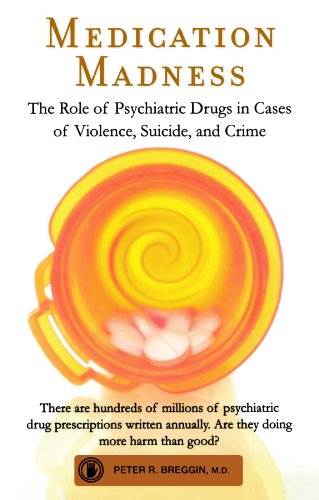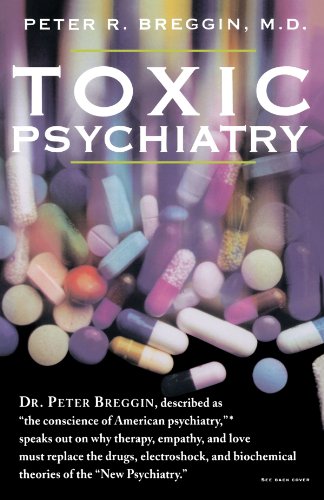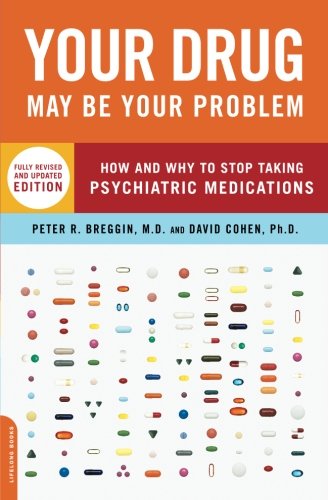Finding your suitable peter breggin is not easy. You may need consider between hundred or thousand products from many store. In this article, we make a short list of the best peter breggin including detail information and customer reviews. Let’s find out which is your favorite one.
Best peter breggin
1. Psychiatric Drug Withdrawal: A Guide for Prescribers, Therapists, Patients and their Families
Feature
Used Book in Good ConditionDescription
As a physician who specializes in addiction medicine and drug withdrawal and written widely on them, I recommend Dr. Breggin's book to every health professional who deals with anyone taking psychiatric drugs. He gives highly useful information and reasons for stopping or avoiding them. It's an excellent one-stop source of information about psychiatric drug effects and withdrawal. Prescribers, therapists, patients, and families will benefit from this guidebook.
Charles L. Whitfield, MD
Bestselling author of Healing the Child Within and many other books
Peter Breggin has more experience in safely withdrawing psychiatric patients from medication than any other psychiatrist. In this book he shares his lifetime of experience. All of our patients deserve the benefit of our obtaining that knowledge.
Bertram Karon, PhD
Professor of Psychology, Michigan State University
Author, The Psychotherapy of Schizophrenia
Former President of the Division of Psychoanalysis of the American Psychological Association
This is such an important book. Describing the problem of withdrawal from psychiatric drugs in detail, and providing clear advice regarding how to deal with this problem as Peter has done so well in this book, is long overdue. For decades, the belief system that is mainstream psychiatry has denied the existence of withdrawal problems from the substances they prescribe so widely. In reality, withdrawal problems with psychiatric drugs is a common occurrence. Because of psychiatry's reckless denial of this real and common problem, millions of people worldwide have not had the support and care they desperately need when attempting to come off psychiatric drugs, often been erroneously advised that these problems are confirmation of the existence of their supposed original so-called 'psychiatric illness.' Dr. Breggin's book is therefore both timely and necessary."
Terry Lynch, MD
Physician and Psychotherapist
Author of Beyond Prozac: Healing Mental Suffering Without Drugs and Selfhood: A Key to the Recovering of
Emotional Well Being, Mental Health and the Prevention of Mental Health Problems
Dr. Peter Breggin has written an invaluable reference for mental health professionals and lay-persons alike who are seeking a way out of dependency on psychiatric drugs. He describes the many dangers of psychiatric medication in straightforward research-based and contextually nuanced terms. Most helpfully, he articulates a method of empathic, person-centered psychotherapy as an alternative to the prevailing emotionally and system disengaged drug-centered approach. In this book, Dr. Breggin systematically outlines how to safely withdraw a patient from psychiatric medication with rich case examples drawn with the detail and sensitivity to individual and situational differences that reveal not only his extensive clinical experience, but his clear, knowledgeable, and compassionate vision of a more humane form of treatment. In this volume, Dr. Peter Breggin has again demonstrated that he is a model of what psychiatry can and should be. This is an indispensable text for both mental health trainees and experienced practitioners seeking a practical alternative to the dominant drug-centric paradigm.
Gerald Porter, PhD
Vice President for Academic Affairs
School of Professional Psychology at Forest Institute
This much needed book and guide to psychiatric medication withdrawal is clearly written and easy to understand. As people become more empowered and able to inform themselves about the effects of pharmaceuticals, practitioners will be called upon to wean their patients off of damaging medications. This book will provide that guidance. Thank you Dr. Breggin for having the courage to oppose conventional psychiatric thinking and the caring to improve the quality of life for individuals who are ready to experience their own innate healing instead of reaching for a pill to mask the symptoms.
Melanie Sears, RN, MBA
Author, Humanizing Health Care and Choose Your Words
Today many psychologists, nurses, social workers, and counselors are struggling with how to help adults and the parents of children who are over-medicated or who wish to reduce or stop taking their psychiatric drugs. Dr. Breggin's book shows non-prescribing professionals, as well as prescribers, how to respond to their patient's needs in an informed, ethical, and empowering fashion.
Sarton Weinraub, PhD
Clinical Psychologist
Director, New York Person-Centered Resource Center, NYC
This is the first book to establish guidelines and to assist prescribers and therapists in withdrawing their patients from psychiatric drugs, including those patients with long-term exposure to antipsychotic drugs, benzodiazepines, stimulants, antidepressants, and mood stabilizers. It describes a method developed by the author throughout years of clinical experience, consultations with experienced colleagues, and scientific research. Based on a person-centered collaborative approach, with patients as partners, this method builds on a cooperative and empathic team effort involving prescribers, therapists, patients, and their families or support network.
The author, known for such books as Talking Back to Prozac, Toxic Psychiatry, and Medication Madness, is a lifelong reformer and scientist in mental health whose work has brought about significant change in psychiatric practice. This book provides critical information about when to consider psychiatric drug reduction or withdrawal, and how to accomplish it as safely, expeditiously, and comfortably as possible. It offers the theoretical framework underlying this approach along with extensive scientific information, practical advice, and illustrative case studies that will assist practitioners in multiple ways, including in how to:
- Recognize common and sometimes overlooked adverse drug effects that may require withdrawal
- Treat emergencies during drug therapy and during withdrawal
- Determine the first drugs to withdraw during multi-drug therapy
- Distinguish between withdrawal reactions, newly occurring emotional problems, and recurrence of premedication issues
- Estimate the length of withdrawal
2. Guilt, Shame, and Anxiety: Understanding and Overcoming Negative Emotions
Feature
Prometheus BooksDescription
With the first unified theory of guilt, shame, and anxiety, this pioneering psychiatrist and critic of psychiatric diagnoses and drugs examines the causes and effects of psychological and emotional suffering from the perspective of biological evolution, child development, and mature adult decision-making. Drawing on evolution, neuroscience, and decades of clinical experience, Dr. Breggin analyzes what he calls our negative legacy emotionsthe painful emotional heritage that encumbers all human beings. The author marshals evidence that we evolved as the most violent and yet most empathic creatures on Earth. Evolution dealt with this species-threatening conflict between our violence and our close-knit social life by building guilt, shame, and anxiety into our genes. These inhibiting emotions were needed prehistorically to control our self-assertiveness and aggression within intimate family and clan relationships.Dr. Breggin shows how guilt, shame, and anxiety eventually became self-defeating and demoralizing legacies from our primitive past that no longer play any useful or positive role in mature adult life. He then guides the reader through the Three Steps to Emotional Freedom, starting with how to identify negative legacy emotions and then how to reject their control over us. Finally, he describes how to triumph over and transcend guilt, shame, and anxiety on the way to greater emotional freedom and a more rational, loving, and productive life.
3. Medication Madness: The Role of Psychiatric Drugs in Cases of Violence, Suicide, and Crime
Description
In Medication Madness, psychiatrist Peter R. Breggin, M.D., describes how people taking psychiatric medication can experience abnormal behavioral reactions, including suicide, violence, emotional breakdowns, and criminal acts. Dr. Breggin explains his concept of "medication spellbinding": individuals taking psychiatric drugs may have no idea whatsoever that their mental conditions are deteriorating and that their actions are no longer under control. He proves his argument by documenting dozens of cases from his practice and his consultations in legal cases.
Reading like a thriller, the book also examines how the FDA, the pharmaceutical industry, and the medical establishment continue to oversell the value of these drugs, and he provides information on how to safely stop taking psychiatric medications. Medication Madness is a compelling and frightening read as well as a cautionary tale about our reliance on medicine to fix what ails us.
4. Heart of Being Helpful: Empathy and the Creation of a Healing Presence
Feature
Used Book in Good ConditionDescription
Based on more than 30 years of clinical experience as a psychiatrist and a therapist, Dr. Breggin's book, now available in an affordable paperback, illustrates the importance of developing a therapeutic bond--or healing presence--between helping professionals and their clients. The author provides useful vignettes, case studies, and personal insights to help both beginning and experienced therapists develop more empathy in therapeutic relationships. He asserts that the first step toward effective treatment is empathic self-transformation in the therapist. It is empathy and self-transformation that lie at the heart of being helpful. Topics include vulnerability, nurturing, helplessness, forgiveness, and spirituality, as well as tips for working with clients in extreme emotional crises, children and families, and patients of culturally diverse backgrounds.
5. Toxic Psychiatry: Why Therapy, Empathy and Love Must Replace the Drugs, Electroshock, and Biochemical Theories of the "New Psychiatry"
Description
Prozac, Xanax, Halcion, Haldol, Lithium. These psychiatric drugs--and dozens of other short-term "solutions"--are being prescribed by doctors across the country as a quick antidote to depression, panic disorder, obsessive-compulsive disorder, and other psychiatric problems. But at what cost?
In this searing, myth-shattering expos, psychiatrist Peter R. Breggin, M.D., breaks through the hype and false promises surrounding the "New Psychiatry" and shows how dangerous, even potentially brain-damaging, many of its drugs and treatments are. He asserts that: psychiatric drugs are spreading an epidemic of long-term brain damage; mental "illnesses" like schizophrenia, depression, and anxiety disorder have never been proven to be genetic or even physical in origin, but are under the jurisdiction of medical doctors; millions of schoolchildren, housewives, elderly people, and others are labeled with medical diagnoses and treated with authoritarian interventions, rather than being patiently listened to, understood, and helped.
Toxic Psychiatry sounds a passionate, much-needed wake-up call for everyone who plays a part, active or passive, in America's ever-increasing dependence on harmful psychiatric drugs.
6. Your Drug May Be Your Problem, Revised Edition: How and Why to Stop Taking Psychiatric Medications
Description
7. Brain-Disabling Treatments in Psychiatry: Drugs, Electroshock, and the Role of the Fda
Feature
Used Book in Good ConditionDescription
Text on the brain-disabling effects of the physical treatments in psychiatry. For clinicians and investigators. DNLM: Mental Disorders--therapy.8. Reclaiming Our Children: A Healing Plan For A Nation In Crisis
Feature
Used Book in Good ConditionDescription
9. The Anti-Depressant Fact Book: What Your Doctor Won't Tell You About Prozac, Zoloft, Paxil, Celexa, and Luvox












